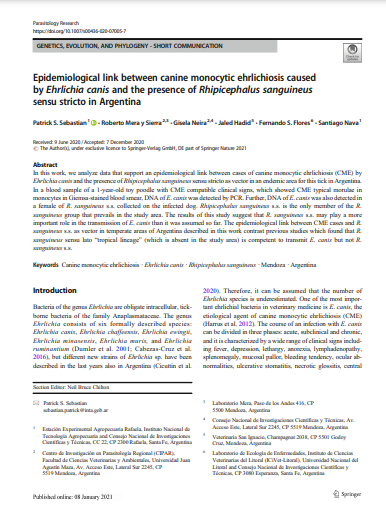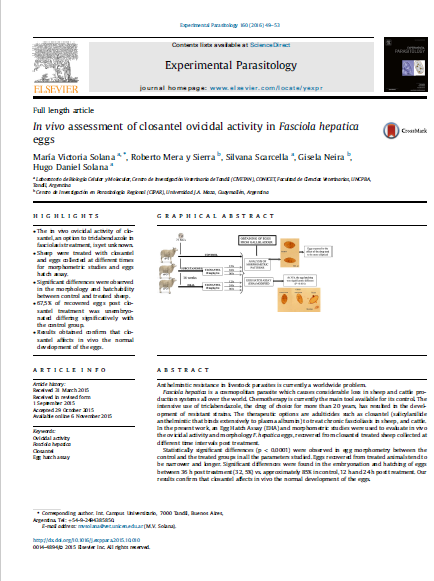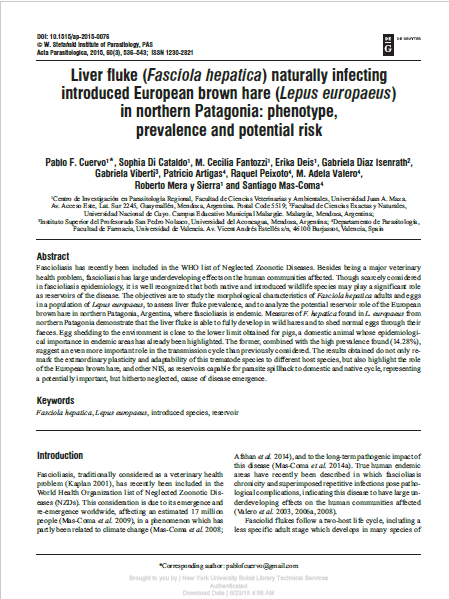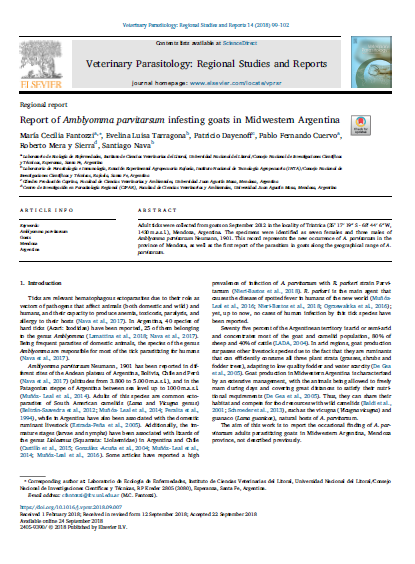Browsing Resultados de Investigación by Author "Mera y Sierra, Roberto"
Now showing items 1-6 of 6
-
Distribución de parásitos gastrointestinales de caprinos en la provincia de Mendoza en las distintas regiones productivas
Mera y Sierra, Roberto (2013) -
Enfermedades que pueden transmitirnos nuestras mascotas
Mera y Sierra, Roberto (2019-08-13)Reportaje de Canal 9 Televida, Mendoza al Dr. Roberto Mera y Sierra. En estos momentos hay una emergencia mundial por la mordedura de garrapatas en humanos. En Mendoza y en las ciudades también se ha visto un crecimiento de la hidatidosis, una enfermedad provocada por la materia fecal del animal, entre otras. -
Epidemiological link between canine monocytic ehrlichiosis caused by Ehrlichia canis and the presence of Rhipicephalus sanguineus sensu stricto in Argentina
Sebastian, Patrick; Mera y Sierra, Roberto; Neira, Gisela; Hadid, Jaled; Flores, Fernando; Nava, Santiago (Parasitology Research Editorial, 2021-01-08)In this work, we analyze data that support an epidemiological link between cases of canine monocytic ehrlichiosis (CME) by Ehrlichia canis and the presence of Rhipicephalus sanguineus sensu stricto as vector in an endemic area for this tick in Argentina. In a blood sample of a 1-year-old toy poodle with CME compatible clinical signs, which showed CME typical morulae in monocytes in Giemsa-stained blood smear, DNA of E. canis was detected by PCR. Further, DNA of E. canis was also detected in a female of R. sanguineus s.s. collected on the infected dog. Rhipicephalus sanguineus s.s. is the only ... -
In vivo assessment of closantel ovicidal activity in Fasciola hepatica eggs.
Solana, María Victoria; Mera y Sierra, Roberto; Scarcella, Silvana; Neira, Gisela; Solana, Hugo Daniel (Editorial Experimental Parasitology, 2016)Anthelmintic resistance in livestock parasites is currently a worldwide problem. Fasciola hepatica is a cosmopolitan parasite which causes considerable loss in sheep and cattle production systems all over the world. Chemotherapy is currently the main tool available for its control. The intensive use of triclabendazole, the drug of choice for more than 20 years, has resulted in the development of resistant strains. The therapeutic options are adulticides such as closantel (salicylanilide anthelmintic that binds extensively to plasma albumin) to treat chronic fascioliasis in sheep, and cattle. In ... -
Liver fluke (Fasciola hepatica) naturally infecting introduced European brown hare (Lepus europaeus) in northern Patagonia: phenotype, prevalence and potential risk
Cuervo, Pablo Fernando; Di Cataldo, Sophia; Fantozzi, María Cecilia; Deis, Erika; Diaz Isenrath, Gabriela; Viberti, Gabriela; Artigas, Patricio; Peixoto, Raquel; Valero, María Adela; Mera y Sierra, Roberto; Mas-Coma, Santiago (Comité editorial Acta Parasitologica, 2015-06-23)Fascioliasis has recently been included in the WHO list of Neglected Zoonotic Diseases. Besides being a major veterinary health problem, fascioliasis has large underdeveloping effects on the human communities affected. Though scarcely considered in fascioliasis epidemiology, it is well recognized that both native and introduced wildlife species may play a significant role as reservoirs of the disease. The objectives are to study the morphological characteristics of Fasciola hepatica adults and eggs in a population of Lepus europaeus, to assess liver fluke prevalence, and to analyze the potential ... -
Report of Amblyomma parvitarsum infesting goats in Midwestern Argentina
Fantozzi, María Cecilia; Tarragona, Evelina Luisa; Dayenoff, Patricio; Cuervo, Pablo Fernando; Mera y Sierra, Roberto; Nava, Santiago (Comité editorial Veterinary Parasitology, 2018-09-24)Adult ticks were collected from goats on September 2012 in the locality of Trintrica (35° 17′ 19″ S - 68° 44′ 6″ W, 1430 m.a.s.l.), Mendoza, Argentina. The specimens were identified as seven females and three males of Amblyomma parvitarsum Neumann, 1901. This record represents the new occurrence of A. parvitarsum in the province of Mendoza, as well as the first report of the parasitism in goats along the geographical range of A. parvitarsum.















